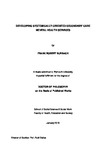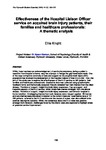DEVELOPING SYSTEMICALLY-ORIENTED SECONDARY CARE MENTAL HEALTH SERVICES
| dc.contributor.supervisor | Dallos, Rudi | |
| dc.contributor.author | Burbach, Frank Robert | |
| dc.contributor.other | Faculty of Health | en_US |
| dc.date.accessioned | 2013-08-06T14:09:58Z | |
| dc.date.available | 2013-08-06T14:09:58Z | |
| dc.date.issued | 2013 | |
| dc.identifier | 10381205 | en_US |
| dc.identifier.uri | http://hdl.handle.net/10026.1/1599 | |
| dc.description.abstract |
Research has indicated that offering support and services for people who experience mental health problems and their families is a complex and contested area. Despite the controversies surrounding therapeutic interventions with families, it has now been recognised that relatives and other supporters of people with mental health problems should be included in their care. Whole- family interventions and partnership working with carers and families is now central to secondary care UK mental health policies and clinical practice guidelines. However, for many families/ carers this remains an aspiration rather than a reality. The way in which we successfully developed family focused mental health practice, as well as specialist family interventions (FI) for people who have been given a diagnosis of psychosis, has therefore aroused considerable interest. The Somerset Partnership NHS Foundation Trust has adopted a Strategy to Enhance Working Partnerships with Carers and Families, developed best practice guidance and has established two complementary workforce development projects - the development of specialist family intervention services and the widespread training of mental health staff to create a ‘triangle of care’ with service users and their families. This has resulted in widespread adoption of systemically informed, ‘whole-family’ practice. In response to the widespread difficulties experienced following other staff- training initiatives we developed specialist family interventions (FI) services by means of an innovative one-year course delivered in partnership with Plymouth University. This training initiative has been widely acknowledged for its novel integration of psycho-educational and systemic approaches and the effective in-situ, multi-disciplinary service development model. An advantage of this approach is that by the end of the course a local FI Service has been established and staff experience fewer difficulties in applying their new skills than people trained in other programmes. We then ensure the continued development of clinical skills by means of a service structure that emphasises on-going supervision. Regular audits of the service and in-depth research studies clearly indicate that the service is effective and highly valued by users. Our ‘cognitive-interactional’ approach, which integrates systemic therapy with psychosocial interventions (individual- and family-CBT) within a collaborative therapeutic relationship, enables us to meet the needs of families in a flexible, tailored manner. The FI teams are able to deliver early interventions for people with first episode psychosis, as well as meeting the NICE guidelines for people with longstanding symptoms. Recognising that many families do not require formal family interventions/ therapy, we also have been designing ‘stepped-care’ family intervention services. We have developed, and extensively evaluated, short training packages to enhance working partnerships with families throughout our mental health services. We have used this three-day package to train a range of community and inpatient teams. We have also encouraged family- inclusive practice with the establishment of a trustwide steering group, practice guidelines and the establishment of ‘family liaison’ posts to facilitate family meetings on inpatient units, as part of the assessment process. Both training initiatives explicitly focus on developing systemic thinking, by integrating CBT and systemic therapy. The involvement of families/ carers in the design and delivery of both training initiatives is also crucial. | en_US |
| dc.language.iso | en | en_US |
| dc.publisher | University of Plymouth | en_US |
| dc.subject | Family inclusive practice | en_US |
| dc.subject | Family Interventions | en_US |
| dc.subject | Triangle of Care | en_US |
| dc.subject | Family Therapy | en_US |
| dc.subject | Service development | en_US |
| dc.subject | Training | en_US |
| dc.subject | NHS workforce development | en_US |
| dc.subject | Systemic mental health services | en_US |
| dc.subject | Somerset mental health services | en_US |
| dc.subject | Cognitive - Interactional approach | en_US |
| dc.subject | Stepped care family services | en_US |
| dc.subject | Integration of CBT and systemic approaches | en_US |
| dc.subject | Whole team training | en_US |
| dc.subject | Whole family approach | en_US |
| dc.subject | Partnership working with families and carers | en_US |
| dc.title | DEVELOPING SYSTEMICALLY-ORIENTED SECONDARY CARE MENTAL HEALTH SERVICES | en_US |
| dc.type | Thesis | |
| plymouth.version | Full version | en_US |
| dc.identifier.doi | http://dx.doi.org/10.24382/1443 |
Files in this item
This item appears in the following Collection(s)
-
01 Research Theses Main Collection
Research Theses Main




